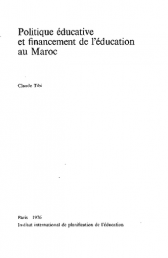
Languages
English, French
Series
International co-operation in education
Year
2004
Pages
168 p.
ISBN
92-803-1263-4
About the publication
The core interest of this book is the education chapter of the Poverty Reduction Strategy Papers, which were introduced four years ago by the World Bank and the International Monetary Fund as a new scheme to fight poverty. The PRSPs have become a powerful tool to diagnose poverty and identify multisectoral strategies to address the problem. They are modifying the mode of co-operation of stakeholders: Policies and initiatives are encouraged to be country-owned and driven, involving ministries, civil society organizations, and the poor themselves, all of whom work alongside donors and development agencies. This study investigates, on the basis of the papers available, the importance given to education. The review provides an insight into the themes and actions privileged in the education chapter: Primary education and to a lesser extent literacy are well covered. The financing schemes envisaged, the complementarities between education and other sectors, and the monitoring mechanisms, among other themes, are considered. The perspectives offered by PRSPs are engaging, as they are a sign that the international community and donors acknowledge, in a concrete manner, that developing countries are and must be active actors of their own development.









